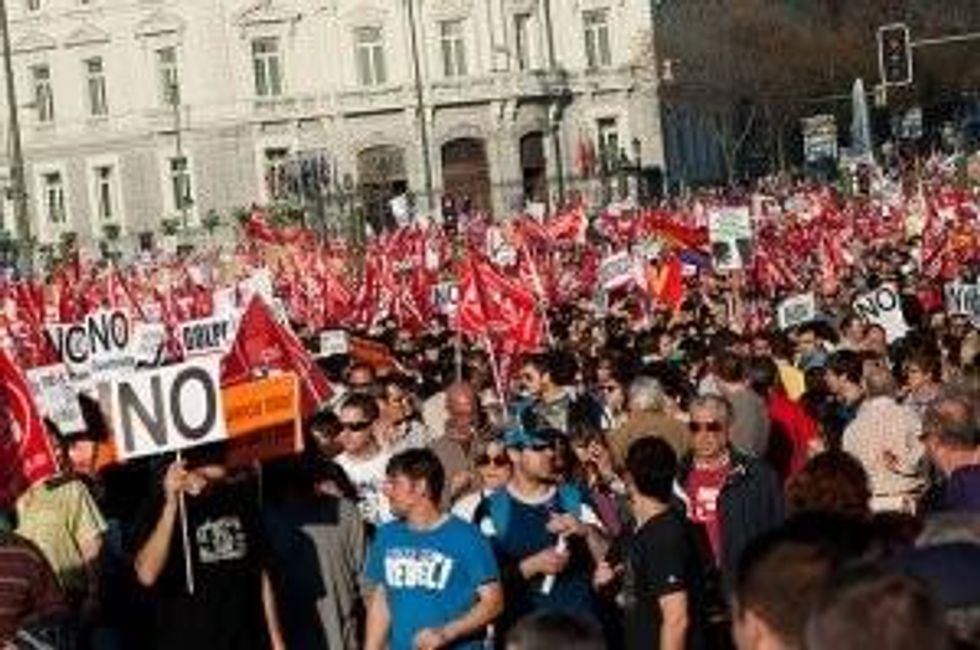Europeans Pushing Back Against Austerity
Protesters in Ireland: "When the Bankers Pay, We'll Pay!"
Europeans are pushing back against government-imposed austerity measures, with protests growing and unions issuing general strikes.
Today in Ireland thousands are protesting a new household tax seen as an "outrageous attack on the poor." On Friday Spain passed its "most austere" budget ever, which had prompted a general strike bringing massive numbers of workers and students to the streets. Greece has seen continued protests over what are seen by Greeks as "barbaric" cuts, while Portugal has held two anti-austerity general strikes in the last several months.
With unemployment rates in the EU at their highest point in the last 15 years, people foresee more misery in sight as austerity measures being imposed by governments has left social safety nets in tatters.
The most recent unemployment figures from Eurostat (pdf), the statistical office of the European Union, show eurozone unemployment at 10.8%, with the highest rates in Spain, Greece, Portugal, and Ireland.
* * *
Ireland
Current unemployment rate: 14.7%
NPR: The Two-Way: Irish Protest Against Household Tax As Austerity Pain Bites Further
The introduction of the household tax, as part of the EU/IMF deal, has triggered a protest campaign led by community and political activists, who are calling for a boycott. They seem to have struck a nerve. Thousands of people took part in what seems to have been an unsually angry demonstration on Saturday in Dublin, waving banners bearing the slogans "Can't Pay, Won't Pay" and "When The Bankers Pay, We'll Pay!".
Opponents of the tax say it is regressive because the rich pay the same as the poor. The public's indignation is being fueled by the common perception in Ireland that a corrupt super-rich elite -- bankers, politicians and property developers -- destroyed the economy, yet have largely gone unpunished.
Irish Times: Threats over household tax 'outrageous' - Socialist TD
Government threats to withdraw public services where the household charge is not paid are an "outrageous" attack on the poor, it has been claimed. [...]
"If they go along these lines they will be encouraging massive social dislocation and further social inequality. It will simply not be permissible," said [Socialist TD] Mr Higgins. "There will be an outcry, an upheaval against that. It will be outrageous."
Minister for the Environment Phil Hogan hinted over the weekend that he would reward authorities that pulled out all the stops to collect outstanding registration payments. Mr Higgins said poor areas would suffer further as a result.
"The wealthiest areas in the country will get more resources than they have already, while the poorest will continue to go without. It's irresponsible," he said. "This would cause a further gap in the massive inequality that already exists. It would be socially destructive."
* * *
Greece
Current unemployment rate: 21%
The Guardian: Business Blog: Eurozone crisis live: Recession fears intensify as unemployment hits record high and manufacturing suffers
From Athens, Helena Smith reports that party leaders have hit the campaign trail, giving interviews about their future plans:
[...] Although [Greek Prime Minister] Papademos last week insisted that a "silent majority" of Greeks want change, and certainly want to stay in the euro zone [as also borne out by polls] opposition to belt-tightening policies that are widely perceived as unfair, and given Greece's contracting economy increasingly counter-productive, is never far away either.
Analysts expect street protests to re-erupt after the elections with trade unionists already speaking of June (when more measures are expected to be unveiled) as a "very hot month."
* * *
Spain
Current unemployment rate: 23.6%
Common Dreams: Spain's New Budget: 'As Austere As It Gets'
Protesters in Madrid during yesterday's general strike (photo: Jesus Perez Pacheco)Spain has unveiled its most austere budget in democratic history today in the wake of massive protests.
The government's budget calls for cuts of 27 billion euros ($35 billion). It cuts central government spending by almost 17% and freezes civil servant wages while requiring them to work an additional 10 hours per month. Another cut hitting households is an 7%-increase in domestic electric prices and 5%-increase on gas.
The austerity has been greatly resisted by the population. Yesterday Spaniards flooded the streets in a general strike to oppose the government's austerity push and labor reforms, which many believe would exacerbate the unemployment levels already the highest in the EU...
* * *
Portugal
Current unemployment rate: 15%
Common Dreams: Anti-Austerity Mass General Strike Takes Portugal
Spain, Italy are next
Today in Portugal public services and transportation came to a halt, as unions enacted a 24-hour general strike for the second time in two months. The metros in Portugal's largest cities have closed as well as major ports. The strike was called in reaction to austerity measures agreed upon by the government in return for a European bailout.
Demonstrations and rallies are planned for the afternoon in 38 cities and towns across the country.
Today's events preclude similar strikes in both Italy and Spain among countries facing European austerity.
An Urgent Message From Our Co-Founder
Dear Common Dreams reader, The U.S. is on a fast track to authoritarianism like nothing I've ever seen. Meanwhile, corporate news outlets are utterly capitulating to Trump, twisting their coverage to avoid drawing his ire while lining up to stuff cash in his pockets. That's why I believe that Common Dreams is doing the best and most consequential reporting that we've ever done. Our small but mighty team is a progressive reporting powerhouse, covering the news every day that the corporate media never will. Our mission has always been simple: To inform. To inspire. And to ignite change for the common good. Now here's the key piece that I want all our readers to understand: None of this would be possible without your financial support. That's not just some fundraising cliche. It's the absolute and literal truth. We don't accept corporate advertising and never will. We don't have a paywall because we don't think people should be blocked from critical news based on their ability to pay. Everything we do is funded by the donations of readers like you. Will you donate now to help power the nonprofit, independent reporting of Common Dreams? Thank you for being a vital member of our community. Together, we can keep independent journalism alive when it’s needed most. - Craig Brown, Co-founder |
Europeans are pushing back against government-imposed austerity measures, with protests growing and unions issuing general strikes.
Today in Ireland thousands are protesting a new household tax seen as an "outrageous attack on the poor." On Friday Spain passed its "most austere" budget ever, which had prompted a general strike bringing massive numbers of workers and students to the streets. Greece has seen continued protests over what are seen by Greeks as "barbaric" cuts, while Portugal has held two anti-austerity general strikes in the last several months.
With unemployment rates in the EU at their highest point in the last 15 years, people foresee more misery in sight as austerity measures being imposed by governments has left social safety nets in tatters.
The most recent unemployment figures from Eurostat (pdf), the statistical office of the European Union, show eurozone unemployment at 10.8%, with the highest rates in Spain, Greece, Portugal, and Ireland.
* * *
Ireland
Current unemployment rate: 14.7%
NPR: The Two-Way: Irish Protest Against Household Tax As Austerity Pain Bites Further
The introduction of the household tax, as part of the EU/IMF deal, has triggered a protest campaign led by community and political activists, who are calling for a boycott. They seem to have struck a nerve. Thousands of people took part in what seems to have been an unsually angry demonstration on Saturday in Dublin, waving banners bearing the slogans "Can't Pay, Won't Pay" and "When The Bankers Pay, We'll Pay!".
Opponents of the tax say it is regressive because the rich pay the same as the poor. The public's indignation is being fueled by the common perception in Ireland that a corrupt super-rich elite -- bankers, politicians and property developers -- destroyed the economy, yet have largely gone unpunished.
Irish Times: Threats over household tax 'outrageous' - Socialist TD
Government threats to withdraw public services where the household charge is not paid are an "outrageous" attack on the poor, it has been claimed. [...]
"If they go along these lines they will be encouraging massive social dislocation and further social inequality. It will simply not be permissible," said [Socialist TD] Mr Higgins. "There will be an outcry, an upheaval against that. It will be outrageous."
Minister for the Environment Phil Hogan hinted over the weekend that he would reward authorities that pulled out all the stops to collect outstanding registration payments. Mr Higgins said poor areas would suffer further as a result.
"The wealthiest areas in the country will get more resources than they have already, while the poorest will continue to go without. It's irresponsible," he said. "This would cause a further gap in the massive inequality that already exists. It would be socially destructive."
* * *
Greece
Current unemployment rate: 21%
The Guardian: Business Blog: Eurozone crisis live: Recession fears intensify as unemployment hits record high and manufacturing suffers
From Athens, Helena Smith reports that party leaders have hit the campaign trail, giving interviews about their future plans:
[...] Although [Greek Prime Minister] Papademos last week insisted that a "silent majority" of Greeks want change, and certainly want to stay in the euro zone [as also borne out by polls] opposition to belt-tightening policies that are widely perceived as unfair, and given Greece's contracting economy increasingly counter-productive, is never far away either.
Analysts expect street protests to re-erupt after the elections with trade unionists already speaking of June (when more measures are expected to be unveiled) as a "very hot month."
* * *
Spain
Current unemployment rate: 23.6%
Common Dreams: Spain's New Budget: 'As Austere As It Gets'
Protesters in Madrid during yesterday's general strike (photo: Jesus Perez Pacheco)Spain has unveiled its most austere budget in democratic history today in the wake of massive protests.
The government's budget calls for cuts of 27 billion euros ($35 billion). It cuts central government spending by almost 17% and freezes civil servant wages while requiring them to work an additional 10 hours per month. Another cut hitting households is an 7%-increase in domestic electric prices and 5%-increase on gas.
The austerity has been greatly resisted by the population. Yesterday Spaniards flooded the streets in a general strike to oppose the government's austerity push and labor reforms, which many believe would exacerbate the unemployment levels already the highest in the EU...
* * *
Portugal
Current unemployment rate: 15%
Common Dreams: Anti-Austerity Mass General Strike Takes Portugal
Spain, Italy are next
Today in Portugal public services and transportation came to a halt, as unions enacted a 24-hour general strike for the second time in two months. The metros in Portugal's largest cities have closed as well as major ports. The strike was called in reaction to austerity measures agreed upon by the government in return for a European bailout.
Demonstrations and rallies are planned for the afternoon in 38 cities and towns across the country.
Today's events preclude similar strikes in both Italy and Spain among countries facing European austerity.
Europeans are pushing back against government-imposed austerity measures, with protests growing and unions issuing general strikes.
Today in Ireland thousands are protesting a new household tax seen as an "outrageous attack on the poor." On Friday Spain passed its "most austere" budget ever, which had prompted a general strike bringing massive numbers of workers and students to the streets. Greece has seen continued protests over what are seen by Greeks as "barbaric" cuts, while Portugal has held two anti-austerity general strikes in the last several months.
With unemployment rates in the EU at their highest point in the last 15 years, people foresee more misery in sight as austerity measures being imposed by governments has left social safety nets in tatters.
The most recent unemployment figures from Eurostat (pdf), the statistical office of the European Union, show eurozone unemployment at 10.8%, with the highest rates in Spain, Greece, Portugal, and Ireland.
* * *
Ireland
Current unemployment rate: 14.7%
NPR: The Two-Way: Irish Protest Against Household Tax As Austerity Pain Bites Further
The introduction of the household tax, as part of the EU/IMF deal, has triggered a protest campaign led by community and political activists, who are calling for a boycott. They seem to have struck a nerve. Thousands of people took part in what seems to have been an unsually angry demonstration on Saturday in Dublin, waving banners bearing the slogans "Can't Pay, Won't Pay" and "When The Bankers Pay, We'll Pay!".
Opponents of the tax say it is regressive because the rich pay the same as the poor. The public's indignation is being fueled by the common perception in Ireland that a corrupt super-rich elite -- bankers, politicians and property developers -- destroyed the economy, yet have largely gone unpunished.
Irish Times: Threats over household tax 'outrageous' - Socialist TD
Government threats to withdraw public services where the household charge is not paid are an "outrageous" attack on the poor, it has been claimed. [...]
"If they go along these lines they will be encouraging massive social dislocation and further social inequality. It will simply not be permissible," said [Socialist TD] Mr Higgins. "There will be an outcry, an upheaval against that. It will be outrageous."
Minister for the Environment Phil Hogan hinted over the weekend that he would reward authorities that pulled out all the stops to collect outstanding registration payments. Mr Higgins said poor areas would suffer further as a result.
"The wealthiest areas in the country will get more resources than they have already, while the poorest will continue to go without. It's irresponsible," he said. "This would cause a further gap in the massive inequality that already exists. It would be socially destructive."
* * *
Greece
Current unemployment rate: 21%
The Guardian: Business Blog: Eurozone crisis live: Recession fears intensify as unemployment hits record high and manufacturing suffers
From Athens, Helena Smith reports that party leaders have hit the campaign trail, giving interviews about their future plans:
[...] Although [Greek Prime Minister] Papademos last week insisted that a "silent majority" of Greeks want change, and certainly want to stay in the euro zone [as also borne out by polls] opposition to belt-tightening policies that are widely perceived as unfair, and given Greece's contracting economy increasingly counter-productive, is never far away either.
Analysts expect street protests to re-erupt after the elections with trade unionists already speaking of June (when more measures are expected to be unveiled) as a "very hot month."
* * *
Spain
Current unemployment rate: 23.6%
Common Dreams: Spain's New Budget: 'As Austere As It Gets'
Protesters in Madrid during yesterday's general strike (photo: Jesus Perez Pacheco)Spain has unveiled its most austere budget in democratic history today in the wake of massive protests.
The government's budget calls for cuts of 27 billion euros ($35 billion). It cuts central government spending by almost 17% and freezes civil servant wages while requiring them to work an additional 10 hours per month. Another cut hitting households is an 7%-increase in domestic electric prices and 5%-increase on gas.
The austerity has been greatly resisted by the population. Yesterday Spaniards flooded the streets in a general strike to oppose the government's austerity push and labor reforms, which many believe would exacerbate the unemployment levels already the highest in the EU...
* * *
Portugal
Current unemployment rate: 15%
Common Dreams: Anti-Austerity Mass General Strike Takes Portugal
Spain, Italy are next
Today in Portugal public services and transportation came to a halt, as unions enacted a 24-hour general strike for the second time in two months. The metros in Portugal's largest cities have closed as well as major ports. The strike was called in reaction to austerity measures agreed upon by the government in return for a European bailout.
Demonstrations and rallies are planned for the afternoon in 38 cities and towns across the country.
Today's events preclude similar strikes in both Italy and Spain among countries facing European austerity.



